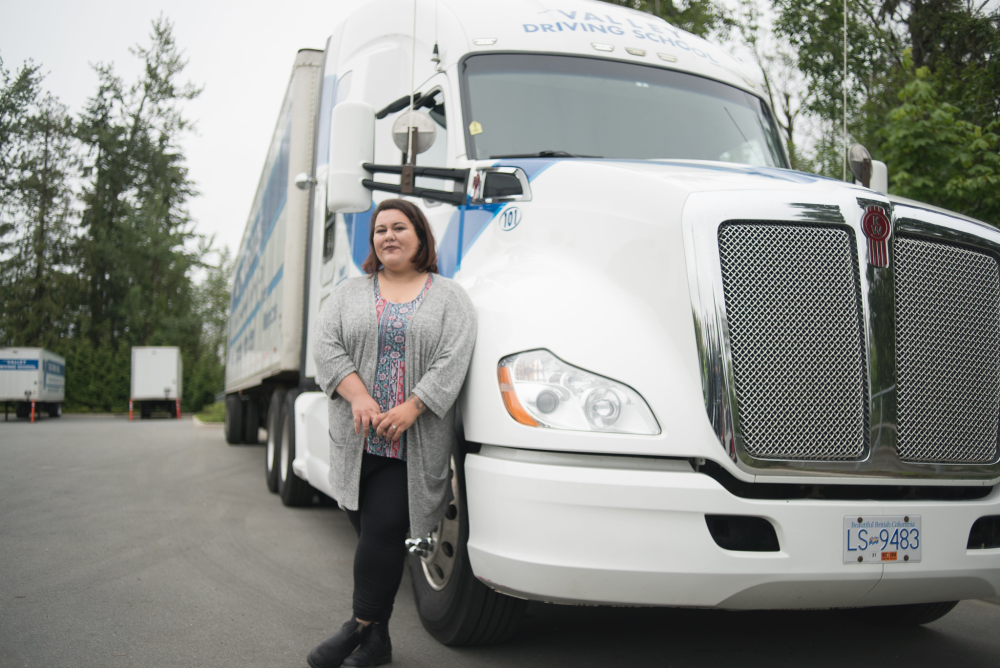In contrast to Canada’s labour force as a whole, women, visible minorities and Indigenous peoples have been chronically underrepresented in the trucking industry and the transportation sector in general. Women, for instance, account for 48% of Canada’s workforce, yet make up only 3% of truck drivers, mechanics, technicians, and cargo workers.
While these groups are a notably small proportion of the overall workforce in the medium- and heavy-duty vehicle (MHDV) sector, industry analysis shows that women and minorities are represented in higher numbers among North America’s small-fleet owner-operators. With transformative changes to the MHDV sector on the horizon, small-fleet owners (largely individuals who have been historically underserved according to recent research out of Global Sustainable Mobility Partnership) will need support systems that are tailored to the specific challenges they will soon face as the country transitions to electric and low-carbon vehicles.
Transportation is second biggest source of carbon pollution
The transportation sector in Canada is responsible for approximately one-quarter of total greenhouse gas (GHG) emissions, the country’s biggest source of carbon pollution after oil and gas. Currently, nearly half of transportation emissions in Canada stem from MHDVs. Due to a growing number of fleets and increases in the distances travelled, MHDV emissions have continued to rise. The Government of Canada has identified transitioning the MHDV sector to zero-emission vehicles (ZEVs) as critical to cutting transportation GHGs. To that end, the federal government has indicated its intention to develop a regulation that will require 100% MHDV sales to be ZEVs by 2040. Research by the Pembina Institute demonstrates that a transition to ZEVs would decrease MHDV emissions from 35 million tonnes (Mt) in 2020 to 7 Mt (or lower) by 2050 – a reduction in carbon pollution of approximately 80%.
Key to the successful uptake of ZEVs in the MHDV sector, however, is engaging fleet owners and operators through initiatives that increase awareness of, and confidence in, ZEVs. Potential buyers need to become familiar with the vehicle options available on the market, how to access financing, and the benefits from their investment.
The Government of Canada created the Zero Emission Vehicle Awareness Initiative (ZEVAI) to support projects that aim to increase understanding, knowledge, and investment confidence in ZEVs. To ensure that the transition away from diesel-fuelled vehicles is equitable, ZEVAI projects should be designed to address the barriers and challenges specific to fleet owners that include women, visible minorities and Indigenous peoples.
For the ZEVAI program to truly reach all fleet owners in its mandate to help boost demand, the Pembina Institute has developed a framework for integrating diversity, equity and inclusion (DEI) principles within ZEVAI projects which the program can adopt going forward. Ultimately, driving down carbon emissions from the transportation sector will entail policy, regulatory and equity solutions.
A framework for integrating DEI principles
The following steps should be taken to ensure that ZEVAI projects integrate diversity, equity and inclusivity when planning outreach initiatives aimed at fleet owners.
- Indicate if the project will directly serve a community classified as being underrepresented and/or underserved within the sector, or how a project focused on the public at large will inform and consider such groups within the sector.
- Demonstrate that the project team has a clear understanding of the target community’s context, history, and intersectionalities, including how this might impact and shape the engagement approach and scope of educational and awareness-based information.
- Use engagement and outreach strategies that incorporate a range of media outlets, inclusive images, case studies, and translation into diverse languages.
- Create opportunities to meet communities where they are at, and where possible provide firsthand zero-emission MHDV experiences.
- Partner with community-based organizations (such as the Canadian Centre for Diversity and Inclusion, Women Business Enterprises Canada Council, Association for New Canadians and other non-profit, charitable organizations), local champions, diverse trucking associations (such as Women in Trucking, DESI Trucking Association, South Asian Trucking Association of Canada etc.), dealers, and/or others to extend engagement with underrepresented and/or underserved groups in the sector.
- Practice authentic engagement over performative engagement by setting and communicating clear goals and expectations, avoiding biases, integrating flexibility into project design, and facilitating open feedback channels.
- Provide reimbursements to remove financial barriers to participation.
- Develop, measure and report on DEI-related key performance indicators.
- To the extent possible, seek out ways to couple project goals with supporting benefits to the wider community.
 As the Pembina Institute continues to consult with communities and stakeholders on the optimal means of transitioning the MHDV sector away from fossil fuels, we will be incorporating this framework into our own practices. Projects scheduled to launch later this year will build on the analysis and research in the Zero-Emission Vehicle Awareness & Education report and will apply an equity lens to our outreach efforts.
As the Pembina Institute continues to consult with communities and stakeholders on the optimal means of transitioning the MHDV sector away from fossil fuels, we will be incorporating this framework into our own practices. Projects scheduled to launch later this year will build on the analysis and research in the Zero-Emission Vehicle Awareness & Education report and will apply an equity lens to our outreach efforts.
Our goal is that the outcomes will help guide supports that ensure clean vehicles are widely accessible and charging/refuelling infrastructure is readily available for all communities. One example is Pembina’s Transforming Transportation in Edmonton project, which seeks to build a cohort of women operating fleets to engage in knowledge sharing and policy advocacy to advance low-emission transportation.







